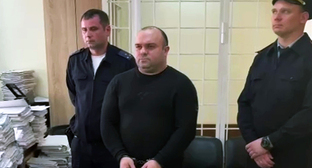31 May 2022, 23:42
Week in the Caucasus: review of main events of May 23-29, 2022
Persecution of participants in pacifist actions in Southern Russia; protests in Armenia demanding the resignation of Nikol Pashinyan; decisions of courts in Nalchik and Vladikavkaz on the lawsuits filed by fighters of the National Guard of Russia dismissed from service; pardoning of prisoners in Azerbaijan; adoption of the Russian law on dual citizenship with South Ossetia; creation of border delimitation commissions in Armenia and Azerbaijan, – see the review of these and other events in the Caucasus during the week of May 23-29, 2022, prepared by the “Caucasian Knot”.
Persecution of participants in pacifist actions in Southern Russia
In Southern Russia, the persecution of residents who oppose the special military operation in Ukraine and related events continues. So, on May 24, it was reported that in Sochi, a court found local resident Sergey Sokolov guilty under the article on discrediting the Russian armed forces and fined him 30,000 roubles for a pacifist comment on social media. In Krasnodar, local resident Nadezhda Sazanova, who took part in a pacifist action on March 31, was also fined 30,000 roubles under the same article. On May 26, a court in Krasnodar found Vitaly Nikolaev, a dentist who held a pacifist picket on April 27, guilty of discrediting the Russian armed forces and fined him 30,000 roubles. On May 28, two protocols at once were drawn up against Daria Vilkova, a resident of Krasnodar, for her pacifist posts. The activist was accused of discrediting the Russian army and posting Nazi symbols. On May 29, it became known that a woman from North Ossetia was fined under the article about discrediting the Russian army, and two other women from the republic were found guilty under the same article. This week, among those accused of discrediting the Russian armed forces were residents of other regions, including Kalmykia, Adygea, and the Stavropol Territory.
Protests in Armenia demanding resignation of Nikol Pashinyan
Supporters of the opposition continue their protest actions demanding the resignation of Armenian Prime Minister Nikol Pashinyan, which began on April 25. On May 27, the activists held motor rallies in the cities of Spitak and Sevan, during which traffic was temporarily blocked. On May 28, the day of the First Republic, the opposition held a motor rally from Aparan and Sardarapat and a march through Yerevan, during which opposition supporters announced a threat to the statehood of Armenia. Local analysts express different opinions while commenting on the above-mentioned actions. Thus, according to political observer Naira Airumyan, the protest movement is on the next rise, and the actions of the opposition have become targeted. In turn, political strategist Armen Badalyan notes that the protest movement has come to a standstill, with the lack of a creative approach having its effect.
Decisions of courts in Nalchik and Vladikavkaz on lawsuits filed by fighters of National Guard of Russia dismissed from service
On May 25, the Nalchik Garrison Military Court refused to grant the lawsuit for the reinstatement of 115 former employees of the National Guard of Russia who were dismissed from service after leaving the special military operation zone in Ukraine. Let us remind you that the fighters of the National Guard of Russia demanded to recognize their dismissal from military service as illegal. They stated that they had not violated the terms of their contracts, since commanders did not give any order to continue battles. The plaintiffs said they would file an appeal against the court’s decision.
On May 26, the Vladikavkaz Garrison Military Court ruled on a lawsuit filed by 30 former employees of the National Guard of Russia, who also requested the court to declared illegal the order on their dismissal. Their claim is partially granted, follows from the case card posted on the court’s website, with no disclosure of the information concerning what kind of claims are granted.
Pardoning of prisoners in Azerbaijan
On the eve of Azerbaijan Independence Day, which is celebrated on May 28, the Baku Human Rights Club sent a list of 57 people to the president of the country and the commission on pardoning prisoners with a request for their pardon. The monitoring group of human rights organizations of Azerbaijan sent a list of 37 prisoners. Most of the people included in those lists are political prisoners, human rights defenders note. On May 27, Azerbaijani President Ilham Aliev signed an order to pardon 213 people. The number of those pardoned includes more than 20 people from the list of political prisoners. In particular, among them are opposition supporter Salekh Rustamov, journalists Afghan Sadygov and Bakhruz Aliev, Pasha Umudov, a member of the Popular Front Party of Azerbaijan (PFPA), and 19 convicts in the “Ganja case”. On May 28, the execution of the pardoning order began, and the convicts were released, including Salekh Rustamov and Afghan Sadygov. They said that long-term hunger strikes spent in prison had a negative impact on their health. Human rights defenders considered the president’s decision “half-hearted” and called the number of pardoned political prisoners insufficient.
Adoption of Russian law on dual citizenship with South Ossetia
On May 28, Russian President Vladimir Putin signed a law that would allow holders of South Ossetian passports to take Russian citizenship without renouncing their current one. Let us remind you that on March 14, President Putin submitted to the State Duma a draft federal law on the ratification of the agreement on dual citizenship and simplification of the procedure for obtaining Russian citizenship for citizens of South Ossetia. On May 19, State Duma members ratified the agreement, and on May 25, it was approved by the Federation Council. The agreement on dual citizenship will provide residents of South Ossetia with social protection and will give them a possibility to receive Russian pensions. The agreement will enter into force after the parties exchange instruments of ratification.
Creation of border delimitation commissions in Armenia and Azerbaijan
On May 23, Azerbaijani President Ilham Aliev signed a decree on the creation of a public commission to delimit the border with Armenia. On the same day, Armenian Prime Minister Nikol Pashinyan signed a decree on the establishment of a commission on the delimitation of the border with Azerbaijan and border security. The creation of those commissions was the result of a meeting between Ilham Aliev and Nikol Pashinyan on May 22 in Brussels with Charles Michel, President of the European Council. At the meeting, the parties agreed to start the work of a commission on the delimitation of the border and also agreed on the need to start unblocking transport communication in the region and discuss a future peace treaty. According to Baku analysts, the meeting in Brussels did not lead to tangible progress in the negotiations on the settlement of the conflict between the countries, but the parties demonstrated their desire for the previously reached agreements.
This article was originally published on the Russian page of 24/7 Internet agency ‘Caucasian Knot’ on May 31, 2022 at 11:25 am MSK. To access the full text of the article, click here.




